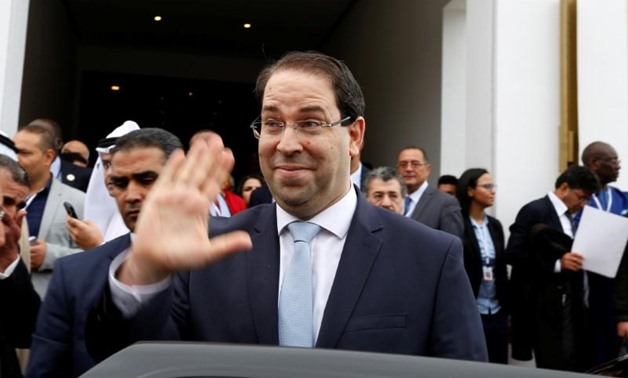
Tunisia's Prime Minister Youssef Chahed gestures after the 43rd Annual Meeting of the Islamic Development Bank Group (IsDB Group) in Tunis, Tunisia April 4, 2018. REUTERS/Zoubeir Souissi
TUNIS - 30 May 2018: Tunisian Prime Minister Youssef Chahed said on Tuesday that the president's son had destroyed the ruling Nidaa Tounes party and that the crisis in the party has affected state institutions.
The president's son, Hafedh Caid Essebsi, who is the leader of Nidaa Tounes, had called for the prime minister's dismissal because of his government's failure to revive the economy.
But the moderate Islamist party Ennahda refused to accept this change and said the exit of the prime minister would hit stability at a time when the country needed economic reforms.
This is the first public criticism by Chahed against the president's son, whose opponents accuse him of seeking to exploit his family influence to control the country.
The president's son rejected the criticism and said he is exercising his political rights.
"Hafedh Caid Essebsi (has) destroyed the party and the ruling party crisis has affected the state institutions; it is time to reform the party," Chahed said in a speech.
Nidaa Tounes lost municipal elections this month, coming second after Ennahda.
The North African country has been hailed as the Arab Spring's only democratic success because protests toppled autocrat Zine El Abidine Ben Ali in 2011 without triggering violent upheaval, as happened in Syria and Libya.
But since 2011, nine cabinets have failed to resolve Tunisia's economic problems, which include high inflation and unemployment, and impatience is rising among lenders such as the International Monetary Fund, which have kept the country afloat.
Seven prime ministers have failed to fix a sluggish economy. Turmoil and militant attacks have deterred investors and tourists, eroding living standards of ordinary people and causing an increase in unemployment.
Annual inflation hit a record high of 7.7 percent in April as the dinar currency tanked, making food imports more expensive.

Comments
Leave a Comment